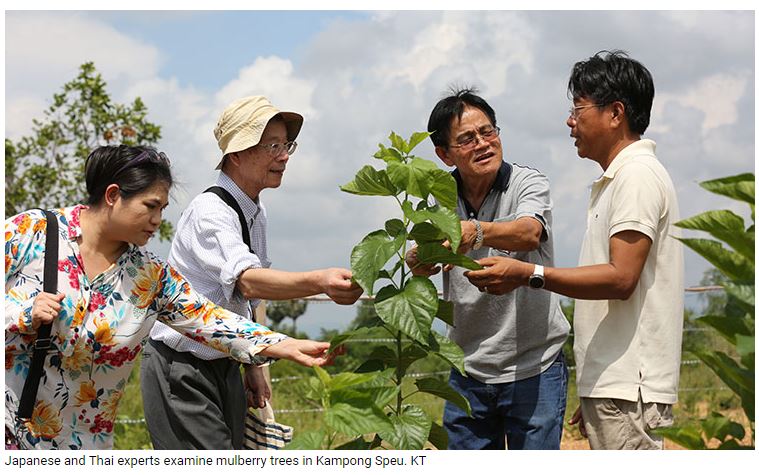Cambodia: With support from Thai university, sericulture sector set to flourish
In a bid to revive the local sericulture sector, Mahasarakham University, an academic institution based in Northeastern Thailand, is providing technical assistance to a new silk research centre established by the Royal University of Phnom Penh (RUPP) and to silk communities around the country.
Professor Motoyuki Sumida, sericulture expert at Mahasarakham University, who is now in Cambodia leading a delegation of silk experts, told Khmer Times on Saturday that they are providing technical support on growing mulberry trees, building rearing houses as well as raising and breeding silkworms.
He said this is the first time his university is cooperating with RUPP.
Visiting a farm in Kampong Speu’s Oral district that is being supported by RUPP’s research centre, Mr Sumida said the local sericulture industry has great potential. “We would like to do the best we can to support communities like this.”
“We have a close collaboration with RUPP, so we can support them and their partnering communities around the country with advice anytime they need it,” he said.

RUPP’s silk research centre is still under construction, and expected to be finished by July. The centre will tackle every step involved in producing silk, from silkworm rearing and silk reeling to weaving and dyeing. Their findings will be shared with local farmers to aid the development of the industry.
Mey Kalyan, chairman of the Board of Trustees at RUPP, said Cambodia must make the most out of this collaboration with a Thai research centre. He said Thailand currently boasts around 20 silk research centres and ample expertise that can help the local sericulture industry advance.
“We started our centre less than a year ago, so we can really benefit from their help as an established research facility,” he said.
“In Cambodia, silk is produced using mostly traditional methods, which is not necessarily cost-effective,” he said. “This partnership with Thailand will allow us to develop the sector step-by-step and make it strong and sustainable,” Mr Kalyan said, adding that they will also work with other experts around the world to aid the development of their school and the local sericulture industry.
Ea Hoknym, owner of the farm in Oral district that Mr Sumida visited on Saturday, said he started growing mulberry trees in November last year, and now has 3.5 hectares dedicated to the plant, growing a total of 22,000 specimens. He hopes to expand to 10 hectares in the near future.
He said the technical assistance provided by Mahasarakham University has proved invaluable. “With their support I have been able to improve the health of my trees.”
Mr Hoknym is now building three new silkworm rearing houses, as well as an exhibit to showcase their production methods and products to local farmers and the public.
“We hope to start producing Cambodian raw silk yarns by August,” he said.
Source: https://www.khmertimeskh.com/50493902/with-support-from-thai-university-sericulture-sector-set-to-flourish/


 Thailand
Thailand




